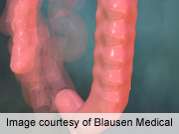(HealthDay)—Lower patient activation, but not limited health literacy, is an independent predictor of suboptimal colonoscopy bowel preparation quality, according to a study published in the March issue of Clinical Gastroenterology and Hepatology.
Marina Serper, M.D., from the Northwestern University Feinberg School of Medicine in Chicago, and colleagues examined the correlation between health literacy, patient activation, and quality of bowel preparation in a cohort of 462 adults (mean age, 62 years) who underwent outpatient colonoscopy. As part of a prospective study, participants had previously completed neurocognitive assessments. Information was collected on cecal intubation, polyp detection, bowel preparation quality, and histopathology.
The researchers found that one-third of patients (134) had suboptimal quality of bowel preparation, while 15 and 17 percent had fair and poor quality, respectively. Limited health literacy correlated with a lower level of education, diabetes, and several chronic conditions (all P < 0.001), but was not associated with colonoscopy preparation quality. Patient activation was not related to any baseline characteristics. After adjustment for demographics and clinical characteristics, independent predictors of suboptimal bowel preparation quality included diabetes (odds ratio [OR], 2.45; 95 percent confidence interval [CI], 1.14 to 5.25) and patient activation (OR, 2.12; 95 percent CI, 1.30 to 3.45), but not limited health literacy (OR, 0.76; 95 percent CI, 0.38 to 1.52).
"Low patient activation was a significant independent predictor of colonoscopy bowel preparation quality, whereas health literacy was not," the authors write. "Interventions to improve colonoscopy quality should consider the importance of patient activation within their design."
More information:
Abstract
Full Text (subscription or payment may be required)
Editorial
Journal information: Clinical Gastroenterology and Hepatology
Copyright © 2014 HealthDay. All rights reserved.




















